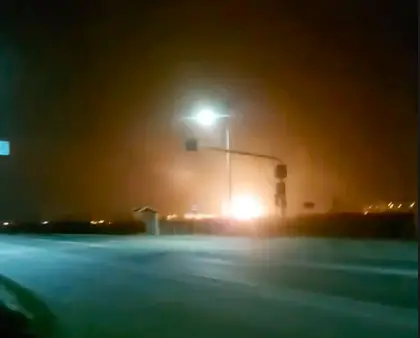Explosions hit another oil refinery in southern Russia at around 3 a.m. local time on Sunday. The Nefte Peregonnyy Zavod in Slavyansk-on-Kuban, in the Krasnodar region was attacked by at least seven unmanned aerial vehicles (UAV), according to Ukrainian reports and videos posted on social media.
The Krasnodar regional authorities said on Sunday morning that one person had died after suffering a suspected heart attack.
JOIN US ON TELEGRAM
Follow our coverage of the war on the @Kyivpost_official.
“The fire on the territory of the Slavyansk oil refinery has now been completely extinguished. According to preliminary information, one person died at the time of the drone attack, the preliminary cause of death being a heart attack,” the Krasnodar region operational headquarters said on Telegram.
“There are no casualties as a direct result of the fire, there is also no threat to the settlement,” it said.
🔥🦅 UAVs attacked Sloviansk-na-Kuban in Krasnodar Krai, Russian Federation.
— MAKS 24 🇺🇦👀 (@Maks_NAFO_FELLA) March 17, 2024
❗It is likely that another refinery was hit. pic.twitter.com/4H3vXtYs33
Roman Sinyagovsky, head of the Slavyansk Municipal District, blaming the attack on Ukraine said on Telegram that one plant worker had been injured.
The Slavyansk-on-Kuban refinery is located in the Krasnodar region, east of the Sea of Azov, less than 150 kilometers (93 miles) from the Kerch Bridge separating occupied Crimea from Russia.
Drone attacks on refineries and energy sites in Russia have increased this week in the run-up to the sham presidential election guaranteed to cement President Vladimir Putin’s dictatorial rule.
Early on Saturday, March 16, two Russian oil refineries in the Samara region, one in Syzran and another in Novokuibyshevsky, were targeted in an overnight drone attack. The attacks occurred on the same morning that many Russians were casting votes and even protesting the farcical balloting.

Moscow Recruits Yemeni Mercenaries for War in Ukraine, Report Says
These attacks mark a continued onslaught against Russian oil enterprises, with more than 15 incidents recorded since the start of the year.
One of the largest attacks occurred on Wednesday, March 13.
Ukrainian UAVs aimed mostly at energy infrastructure. In some attacks they struck hundreds of kilometers deep into Russia.
One of the most seriously hit targets appeared to be an oil refinery in the Ryazan region, more than 500 kilometers inside Russia, where at least three Ukrainian explosive "kamikaze" drones crashed into the major oil-processing facility.
A Kremlin Wednesday morning statement said Russian air defense units from late night Tuesday through Wednesday morning shot down at least 58 Ukrainian strike aircraft including 11 drones over Russia’s Belgorod Region, 8 over the Bryansk Region, 29 over the Voronezh Region, 8 over the Kursk Region, and a single robot plane each over the Ryazan and Leningrad Regions.
If those numbers are confirmed, the Wednesday kamikaze drone wave was the biggest single-day attack launched by Ukraine against targets inside Russia, of the entire Russo-Ukraine war.
The SBU, Ukraine’s national intelligence agency, in a Wednesday statement took credit for the attacks and said a total five oil refineries were struck in two days.
“We are systematically implementing a step-by-step strategy to undermine the economic capacity of the Russian Federation. Our objective is to deprive the enemy of resources and reduce the flow of petroleum-based products that the Russian Federation is using directly for war, for the murder of our citizens,” the SBU statement said in part.
Energy analyst Tom O’Donnell, told Kyiv Post in an exclusive interview that Ukrainian allies’ oil price cap, in conjunction with Ukrainian drones’ physical damage,could be a significant hit to Russian revenues.
“These refineries hit by Ukrainian drones… represent about 12 percent of Russian production… Whatever percentage of Russian refined oil products this impairs, the damage will both deprive the war economy of needed export revenues and/or of much-needed fuels to keep the domestic war economy running.”
You can also highlight the text and press Ctrl + Enter






